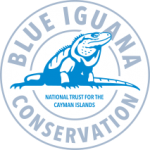International Blue Iguana Day Date in the current year: May 8, 2026
 International Blue Iguana Day is observed annually on May 8. It was established in 2021 by the Blue Iguana Conservation program run by the National Trust for the Cayman Islands to raise awareness of the endangered status of the blue iguana and spur conservation efforts.
International Blue Iguana Day is observed annually on May 8. It was established in 2021 by the Blue Iguana Conservation program run by the National Trust for the Cayman Islands to raise awareness of the endangered status of the blue iguana and spur conservation efforts.The blue iguana, also known as the Grand Cayman blue iguana, Grand Cayman ground iguana or Cayman Island rock iguana, is a lizard species endemic to the island of Grand Cayman. Previously considered a subspecies of the Cuban iguana, it was reclassified as a separate species in 2004.
The blue iguana is one of the largest species of lizards in the Western Hemisphere and the largest native land animal on Grand Cayman, with a total nose-to-tail length up to 5 ft (1.5 m). Blue iguanas are sexually dimorphic: males are larger than females by about one third of their body size and range in color from dark gray to turquoise blue, whereas females are more olive green to pale blue. Like all rock iguanas, blue iguanas are primarily herbivorous.
The wild population of the blue iguana has decreased significantly over the past decades for a number of reasons, including habitat destruction caused by land clearance and conversion of traditional crop lands to cattle pasture, vehicle collisions, and predation by cats and dogs. In 1988, British researcher Roger Avery spent two weeks on Grand Cayman and only spotted three blue iguanas. By 2011, fewer than 30 animals were estimated to remain in the wild, and the International Union for the Conservation of Nature (IUCN) listed the blue iguana as a critically endangered species.
To save the blue iguana from extinction, the National Trust for the Cayman Islands launched the Blue Iguana Recovery Program in 1990. Its initial goal was to restore the wild population of blue iguanas to 1,000 individuals. The effort eventually bore fruit: in 2012, the IUCN downgraded the blue iguana from critically endangered to endangered, and by 2018, the 1000th blue iguana was released into the wild.
In 2019, the program began transitioning towards long-term sustainable conservation of the species and was officially rebranded as the Blue Iguana Conservation program. Thanks to receiving two substantial grants from foreign conservation funds, the program expanded its breeding facility, improved husbandry, and hired more personnel to monitor its reserves.
Today, the Blue Iguana Conservation program is a partnership between the National Trust for the Cayman Islands, the Cayman Islands Department of Environment, the Queen Elizabeth II Botanic Park, the Wildlife Conservation Society (Bronx Zoo), the San Diego Zoo, the International Reptile Conservation Foundation, the Darwin Initiative, and other stakeholders.
On the occasion of International Blue Iguana Day, the Blue Iguana Conservation facility organizes various events and activities to educate the general public about the blue iguana and raise funds for its conservation. You can get involved with the celebration by donating to or volunteering for the Blue Iguana Conservation, symbolically adopting a blue iguana, and spreading the world on social media with the hashtag #InternationalBlueIguanaDay.
- Category
- International Observances, Ecological Observances
- Tags
- International Blue Iguana Day, international observances, environmental observances, blue iguanas, endangered lizard species